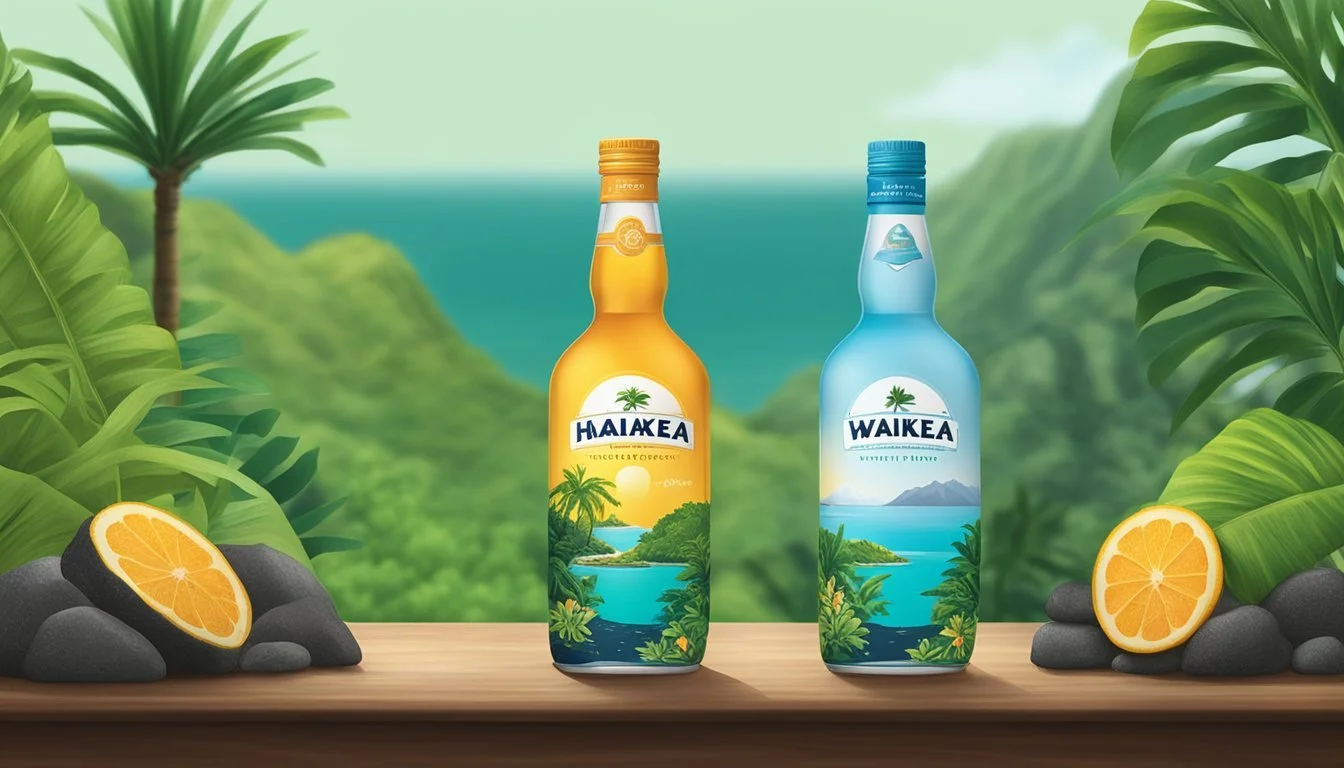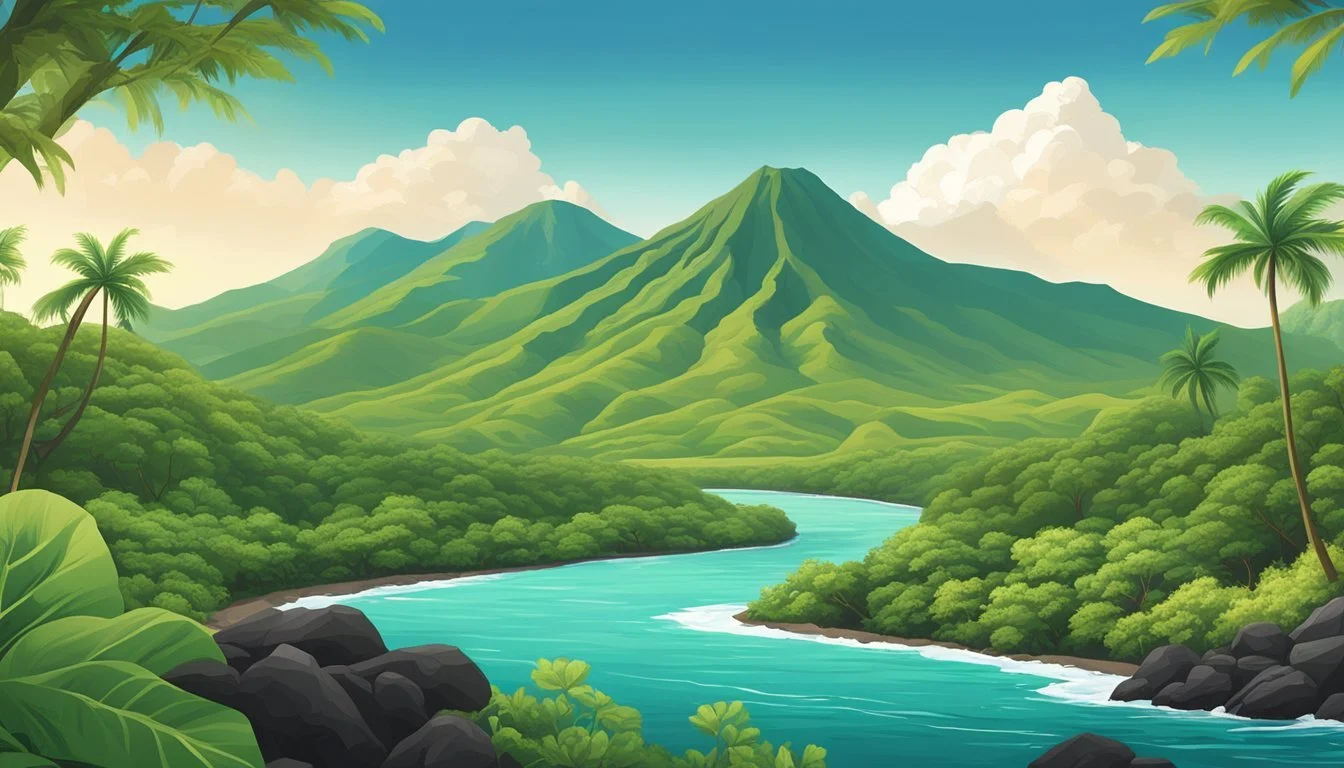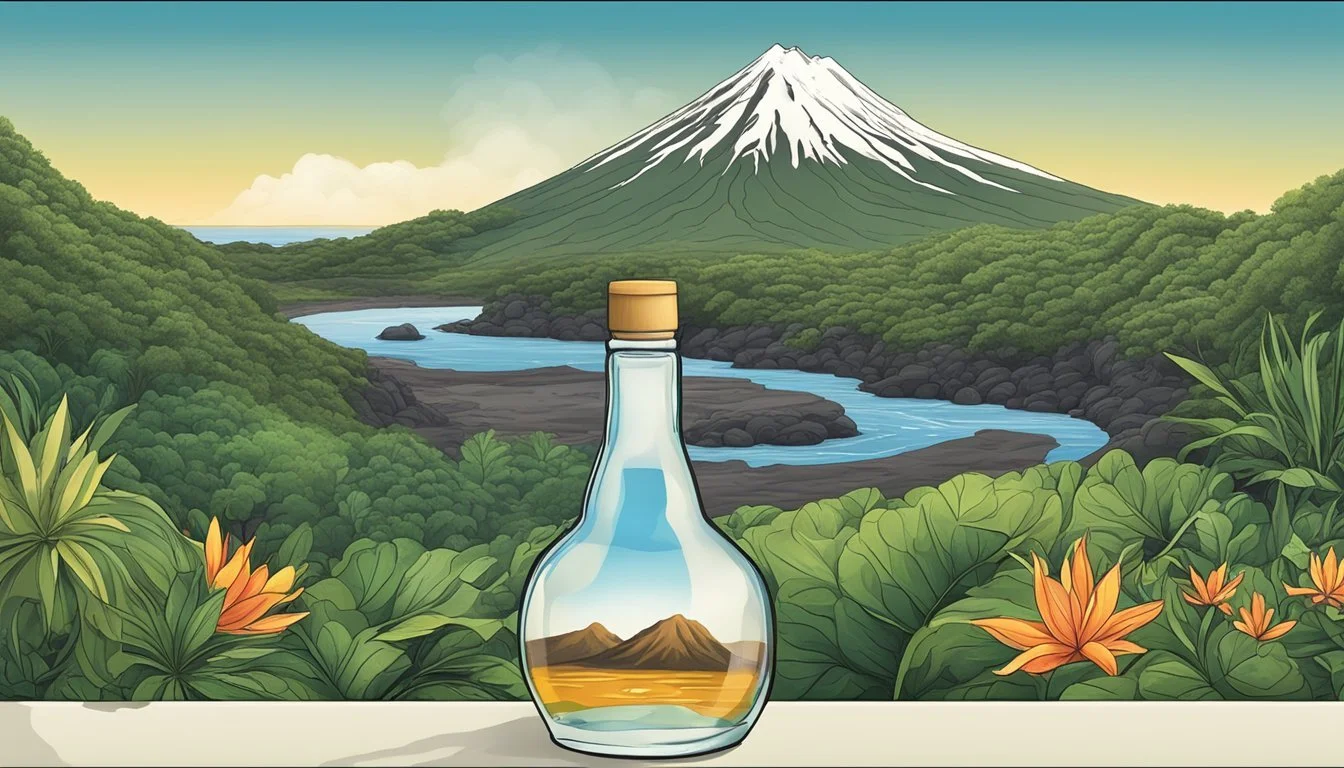Waiakea vs. Hawai’i Volcanic
Which Bottled Water is Better?
Choosing the best bottled water can be a challenge, especially when comparing well-known brands like Waiakea and Hawai’i Volcanic9. Both boast unique features and benefits, making it tricky for consumers to decide which to pick. Waiakea prides itself on a naturally high alkaline pH of 8.8, which helps neutralize acidity within the body. Hawai’i Volcanic9, meanwhile, offers a slightly lower but still alkaline pH range of 7.7 to 8.4, emphasizing its environmental practices and volcanic filtration.
If health benefits are your priority, Waiakea’s higher alkaline pH may edge out in favor. On the other hand, Hawai’i Volcanic9’s focus on ecological sustainability could appeal more to environmentally conscious consumers. Both brands offer transparency about their sources and processes, ensuring customers know exactly what they're drinking.
When it comes to taste, both waters are praised for their crisp and clean flavor, attributed to their volcanic origins. Waiakea’s 30-day filtration process through volcanic rock delivers a balanced mineral composition, while Hawai’i Volcanic9’s innovative approach ensures purity and quality. Readers seeking premium bottled water will find valuable insights in this head-to-head comparison.
Overview of Waiakea and Hawai’i Volcanic
Waiakea was founded in Hilo, Hawaii, and is known for its Hawaiian volcanic water.
The water is naturally alkaline and rich in electrolytes. It is sourced from the Mauna Loa volcano, filtering through thousands of feet of porous volcanic rock. This process enriches the water with minerals and keeps contaminants at bay.
Hawai’i Volcanic offers another unique type of bottled water sourced from Hawaii.
Their water also comes from volcanic origins, ensuring high natural mineral content. Like Waiakea, it benefits from the pristine environment and extensive natural filtration processes of the Hawaiian Islands.
Comparison
Feature Waiakea Hawai’i Volcanic Origin Mauna Loa, Hilo Hawaiian volcanic sources Filtration Through volcanic rock Through volcanic rock Mineral Content Naturally high in electrolytes High natural mineral content Alkalinity Naturally alkaline Typically alkaline
Sustainability is a core principle for both brands.
Waiakea engages in various sustainability and ethical practices, promoting healthy living and providing clean water access to those in need. Elements of environmental responsibility can also be found in Hawai’i Volcanic’s operations.
The uniqueness of each brand lies in their specific sourcing and filtration methods.
Both Waiakea and Hawai’i Volcanic capitalize on the rich, volcanic ecosystems of Hawaii to deliver premium bottled water. Their commitment to quality and natural wellness remains a significant selling point for consumers seeking exceptional hydration.
Source and Sourcing
Waiakea and Hawai’i Volcanic9 are both sourced from Hawaii’s pristine environments, emphasizing sustainability and the purity of their natural water sources. Below, we delve into their distinct sourcing methods and environmental practices.
Natural Sources and Aquifers
Waiakea water is naturally filtered through volcanic rock from the Mauna Loa volcano. Located on the Big Island of Hawaii, the water comes from an aquifer in Kea'au. This area benefits from high levels of rain and snowmelt, contributing to a deep well system that provides exceptionally pure water.
Hawai’i Volcanic9 also sources water from volcanic aquifers on the Big Island. Their water is filtered through porous lava rock, which acts as a natural filtration system. This ensures that the water is rich in minerals and free of contaminants, offering a unique taste profile that is synonymous with volcanic water.
Sustainability Practices in Sourcing
Waiakea incorporates stringent sustainability practices throughout its sourcing process. They use less than 0.003% of the water naturally filtered through Mauna Loa’s volcanic rock. The company focuses on replenishing water resources and minimizes environmental impact. Their facility operates on 100% renewable energy and uses high-grade, recycled plastics for their bottles.
Hawai’i Volcanic9 is committed to preserving natural resources as well. They ensure that their bottling practices are eco-friendly and that the water extraction process does not harm the local ecosystem. Their operations aim to maintain the balance of nature, ensuring that the aquifers remain a sustainable water source for future generations.
Mineral Composition and pH Levels
Mineral composition and pH levels play significant roles in determining the quality and health benefits of bottled water. Waiakea and Hawai’i Volcanic9 are known for their unique mineral profiles and naturally alkaline pH levels.
Health Benefits of Minerals
Mineral content in bottled water contributes to several health benefits. Waiakea water contains essential minerals like calcium, magnesium, potassium, sodium, and silica.
Calcium aids in bone health, while magnesium supports muscle function and heart health. Potassium helps in maintaining proper fluid balance in the body. Sodium, although required in lesser amounts, is necessary for nerve function. Silica contributes to skin health and elasticity.
On the other hand, Hawai’i Volcanic9 also contains a rich array of electrolytes and minerals that are beneficial for overall health. These minerals not only enhance the taste but also assist in maintaining optimal bodily functions.
Alkaline pH and Its Advantages
Waiakea water has a pH range of 7.6 to 8.2, making it naturally alkaline. This alkaline pH helps to neutralize acidity in the body, potentially providing benefits such as improved digestion and detoxification.
An alkaline pH can also help to maintain proper pH balance in the body, which is crucial for cellular functions and overall health. Hawai’i Volcanic9 similarly boasts an alkaline pH, which helps in maintaining optimal body performance.
Both waters not only promote general wellness through their alkaline nature but also contribute to hydration and electrolyte balance. The unique sources, such as volcanic wells, enhance these properties, making them stand out in the market.
Filtration and Purity
Both Waiakea and Hawai’i Volcanic9 promise high levels of purity and rigorous filtration processes that ensure safe drinking water. Understanding their approach to filtration and the influence of volcanic rock can help consumers make an informed choice.
Influence of Volcanic Rock
Waiakea sources its water from a well at the eastern base of Mauna Loa volcano. As the water passes through thousands of feet of porous volcanic rock, it naturally gains electrolytes and minerals.
This unique filtration process imparts an alkaline pH of 7.6 to 8.5.
Hawai’i Volcanic9 undergoes a different filtration process. It starts with collecting water from protected sources. The water is then extensively filtered, ensuring the removal of contaminants. The 7-step HydRO-7 filtration process includes reverse osmosis, providing high-quality purified water.
Through their respective processes, Waiakea and Hawai’i Volcanic9 aim to deliver distinct advantages in taste and purity.
Environmental and Social Responsibility
Waiakea and Hawai’i Volcanic9 both emphasize their dedication to sustainable practices and community support. This section explores their efforts in sustainable packaging, carbon footprint reduction, and social initiatives.
Sustainable Packaging and Carbon Footprint
Waiakea utilizes RPET (recycled polyethylene terephthalate), making their bottles part of a closed-loop recycling system. This material requires 85% less energy to produce compared to virgin plastic. Additionally, the bottles are both recyclable and BPA-free.
Waiakea's production facility operates on 33% renewable energy, further reducing its environmental impact. The company also offsets emissions through certified carbon credits, striving for carbon neutrality.
Hawai’i Volcanic9 sources water from a sustainable aquifer and uses eco-friendly packaging. Refill stations encourage reusable containers, reducing single-use plastic. Their local bottling approach minimizes transportation emissions.
Community Support and Global Initiatives
Waiakea's Kokua Initiative focuses on supporting local communities through various programs. They collaborate with non-profit organizations and contribute to education, conservation, and disaster relief efforts.
Globally, Waiakea partners with Pump Aid to provide clean water to communities in Africa. Through this initiative, they have donated millions of gallons of clean water, significantly impacting public health and quality of life.
Hawai’i Volcanic9 involves itself in environmental conservation efforts, supporting projects that preserve Hawaii’s natural beauty. They also engage in educational programs promoting sustainability practices among local youth.
Together, these brands aim to balance commercial success with meaningful contributions to society and the environment.
Consumer Experience
Waiakea and Hawai’i Volcanic9 offer unique consumer experiences influenced by taste, packaging, availability, and convenience. Evaluating these factors can help determine which bottled water best suits individual preferences.
Taste and Packaging
Waiakea water is renowned for its naturally alkaline pH of 8.8, which imparts a subtle, smooth taste. This is particularly appreciated by those who prefer a milder flavor profile. Hawai’i Volcanic9, meanwhile, is prized for its crisp, clean taste, which some consumers find more refreshing.
Packaging also plays a significant role. Waiakea emphasizes eco-friendly practices with its 100% recycled bottles, appealing to environmentally conscious buyers. The design is simple, yet functional. In contrast, Hawai’i Volcanic9's packaging focuses on aesthetics, using sleek, modern bottles that stand out on shelves.
Availability and Convenience
Waiakea is widely available both online and in physical stores, including major retailers like Whole Foods Market. This accessibility makes it a convenient choice for many. Its presence in various distribution channels ensures that consumers can easily find and purchase it.
Hawai’i Volcanic9, while also available online, may not be as readily found in physical stores across all regions. This limited availability might require consumers to plan their purchases in advance. However, the brand's online presence provides a convenient alternative for those who prefer to shop from home.
By comparing these aspects, consumers can more easily determine which bottled water brand aligns with their needs and lifestyle.
Certifications and Advocacy
Both Waiakea and Hawai’i Volcanic9 emphasize top-notch health and safety standards while also engaging in significant educational and environmental advocacy efforts.
Health and Safety Standards
Waiakea and Hawai'i Volcanic9 adhere to strict quality control procedures to ensure that their bottled water meets international health and safety standards. Waiakea sources its water from the Mauna Loa volcano, filtering it through thousands of feet of volcanic rock. This natural filtration process ensures a clean and pure product.
Waiakea has received certifications from reputable bodies for its health and safety practices. It undergoes regular testing to maintain high standards, and their water is known to be rich in minerals like calcium, magnesium, and silica. Similarly, Hawai'i Volcanic9 also prides itself on offering pure and healthy hydration, with robust quality checks backed by certifications.
Educational and Environmental Advocacy
Waiakea and Hawai’i Volcanic9 are committed to advocacy efforts that focus on environmental conservation and education. Waiakea operates responsibly by bottling less than 0.003% of the water from its source, ensuring minimal ecological impact. They are actively involved in reforestation efforts and support bio-diverse forest preserves around their water source.
Waiakea also collaborates with non-profits to facilitate educational opportunities about sustainable practices and water conservation. Hawai’i Volcanic9, in comparison, emphasizes ethical sourcing and partners with various environmental organizations to promote clean water initiatives. Both brands are dedicated to protecting natural resources and fostering a culture of sustainability.
More About Waiakea
Icelandic Glacial vs Waiakea: Which Bottled Water is Better?
Mountain Valley Spring Water vs Waiakea: Which Bottled Water is Better?
Waiakea vs Kirkland Signature: Which Bottled Water is Better?
Waiakea vs Richard's Rainwater: Which Bottled Water is Better?
Waiakea vs Whole Foods Italian Still Mineral water: Which Bottled Water is Better?
More About Hawai’i Volcanic
Acqua Pana vs Hawaii Volcanic: Which Bottled Water is Better?
Antipodes vs Hawaii Volcanic: Which Bottled Water is Better?
Aqua Carpatica vs Hawaii Volcanic: Which Bottled Water is Better?
Arrowhead vs Hawaii Volcanic: Which Bottled Water is Better?
Boxed Water vs Hawaii Volcanic: Which Bottled Water is Better?
Castle Rock vs Hawaii Volcanic: Which Bottled Water is Better?
Core Hydration vs Hawaii Volcanic: Which Bottled Water is Better?
Deer Park vs Hawaii Volcanic: Which Bottled Water is Better?
Hawaii Volcanic vs 1907water: Which Bottled Water is Better?
Hawaii Volcanic vs Alkaline88: Which Bottled Water is Better?
Hawaii Volcanic vs Big Chill: Which Bottled Water is Better?
Hawaii Volcanic vs BodyArmor: Which Bottled Water is Better?
Hawaii Volcanic vs Cascade Mountain: Which Bottled Water is Better?
Hawaii Volcanic vs CBD Living: Which Bottled Water is Better?
Hawaii Volcanic vs Crystal Geyser: Which Bottled Water is Better?
Hawaii Volcanic vs Crystal Lake: Which Bottled Water is Better?
Hawaii Volcanic vs Essence pH10: Which Bottled Water is Better?
Hawaii Volcanic vs Kirkland Signature: Which Bottled Water is Better?
Hawaii Volcanic vs Liquid Death: Which Bottled Water is Better?
Hawaii Volcanic vs Open Water: Which Bottled Water is Better?
Hawaii Volcanic vs Proud Source: Which Bottled Water is Better?
Hawaii Volcanic vs Pure Life: Which Bottled Water is Better?
Hawaii Volcanic vs Purely Sedona: Which Bottled Water is Better?
Hawaii Volcanic vs Richard's Rainwater: Which Bottled Water is Better?
Hawaii Volcanic vs Simple Truth: Which Bottled Water is Better?
Hawaii Volcanic vs Talking Rain AQA: Which Bottled Water is Better?
Hawaii Volcanic vs Weird Water: Which Bottled Water is Better?
Hawaii Volcanic vs Whole Foods 365: Which Bottled Water is Better?
Hawaii Volcanic vs Whole Foods Italian Still Mineral water: Which Bottled Water is Better?
Hawaiian Springs vs Hawaii Volcanic: Which Bottled Water is Better?
Ice Mountain vs Hawaii Volcanic: Which Bottled Water is Better?
Icelandic Glacial vs Hawaii Volcanic: Which Bottled Water is Better?
Just Water vs Hawaii Volcanic: Which Bottled Water is Better?
Mountain Valley Spring Water vs Hawaii Volcanic: Which Bottled Water is Better?
Nestle Pure Life vs Hawaii Volcanic: Which Bottled Water is Better?
Poland Spring vs Hawaii Volcanic: Which Bottled Water is Better?
San Pellegrino vs Hawaii Volcanic: Which Bottled Water is Better?
Smartwater vs Hawaii Volcanic: Which Bottled Water is Better?
Solan de Cabras vs Hawaii Volcanic: Which Bottled Water is Better?
Topo Chico vs Hawaii Volcanic: Which Bottled Water is Better?
Zephyrhills vs Hawaii Volcanic: Which Bottled Water is Better?





